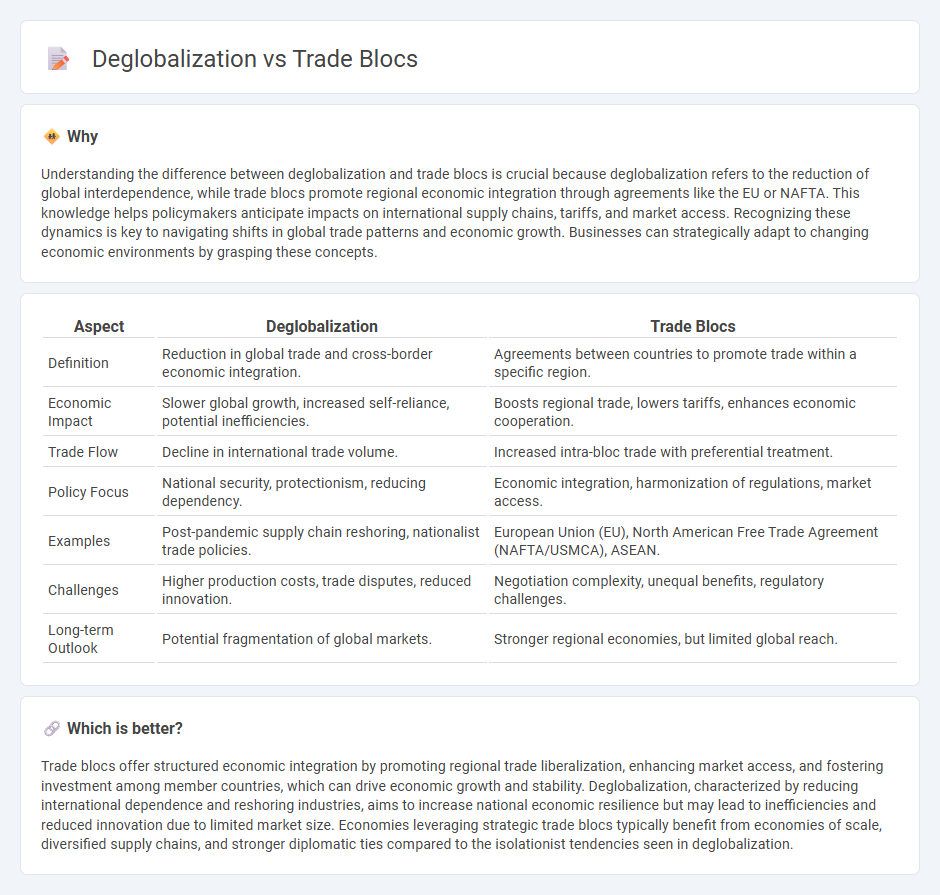
Deglobalization reduces global interdependence by promoting localized production and limiting international trade, impacting supply chains and market access. Trade blocs like the European Union and ASEAN enhance regional economic cooperation through tariff reductions and policy coordination, fostering competitive advantages within member countries. Explore how these contrasting trends reshape global economic dynamics and influence future trade policies.
Why it is important
Understanding the difference between deglobalization and trade blocs is crucial because deglobalization refers to the reduction of global interdependence, while trade blocs promote regional economic integration through agreements like the EU or NAFTA. This knowledge helps policymakers anticipate impacts on international supply chains, tariffs, and market access. Recognizing these dynamics is key to navigating shifts in global trade patterns and economic growth. Businesses can strategically adapt to changing economic environments by grasping these concepts.
Comparison Table
| Aspect | Deglobalization | Trade Blocs |
|---|---|---|
| Definition | Reduction in global trade and cross-border economic integration. | Agreements between countries to promote trade within a specific region. |
| Economic Impact | Slower global growth, increased self-reliance, potential inefficiencies. | Boosts regional trade, lowers tariffs, enhances economic cooperation. |
| Trade Flow | Decline in international trade volume. | Increased intra-bloc trade with preferential treatment. |
| Policy Focus | National security, protectionism, reducing dependency. | Economic integration, harmonization of regulations, market access. |
| Examples | Post-pandemic supply chain reshoring, nationalist trade policies. | European Union (EU), North American Free Trade Agreement (NAFTA/USMCA), ASEAN. |
| Challenges | Higher production costs, trade disputes, reduced innovation. | Negotiation complexity, unequal benefits, regulatory challenges. |
| Long-term Outlook | Potential fragmentation of global markets. | Stronger regional economies, but limited global reach. |
Which is better?
Trade blocs offer structured economic integration by promoting regional trade liberalization, enhancing market access, and fostering investment among member countries, which can drive economic growth and stability. Deglobalization, characterized by reducing international dependence and reshoring industries, aims to increase national economic resilience but may lead to inefficiencies and reduced innovation due to limited market size. Economies leveraging strategic trade blocs typically benefit from economies of scale, diversified supply chains, and stronger diplomatic ties compared to the isolationist tendencies seen in deglobalization.
Connection
Deglobalization and trade blocs are interconnected as the rise of regional trade agreements often reflects nations retreating from global economic integration to prioritize localized supply chains and mutual economic interests. Trade blocs such as the European Union, USMCA, and ASEAN encourage intra-regional trade by reducing tariffs and regulatory barriers, which can simultaneously contribute to a decrease in global trade interconnectedness. This strategic shift reinforces economic nationalism and reshapes international trade patterns by focusing on strengthening economic ties within specific regions rather than engaging in broader global markets.
Key Terms
Regional Integration
Trade blocs such as the European Union, ASEAN, and MERCOSUR promote regional integration by reducing tariffs and harmonizing regulations, facilitating smoother intra-regional trade flows despite trends toward deglobalization. These regional alliances help stabilize economies and create resilient supply chains as global trade faces fragmentation challenges. Explore further to understand how trade blocs counterbalance deglobalization through strategic regional cooperation.
Protectionism
Trade blocs such as the European Union and NAFTA promote regional economic integration by reducing tariffs and harmonizing regulations, countering the rising trend of protectionism associated with deglobalization. Protectionism, characterized by tariffs, import quotas, and restrictive policies, aims to shield domestic industries but often disrupts global supply chains and limits cross-border trade. Explore how evolving trade blocs impact global economic dynamics amid growing protectionist pressures.
Supply Chain Fragmentation
Trade blocs create regional supply chains that enhance efficiency by leveraging proximity and shared regulations, reducing costs and lead times. Deglobalization drives supply chain fragmentation as firms diversify sourcing to mitigate risks from geopolitical tensions and disruptions. Explore how evolving trade policies impact global supply networks and resilience strategies.
Source and External Links
What Are Trade Blocs? - Trade blocs are cooperative agreements between groups of countries to reduce trade barriers and promote economic integration, with common types including preferential trading areas, free trade areas, customs unions, common markets, and economic unions.
What are the top trading blocs in the world? - Major global trade blocs include APEC, the European Union, USMCA, ASEAN, Mercosur, and BRICS, each varying in the level of integration and economic cooperation among member nations.
Trade bloc - Trade blocs are intergovernmental agreements that reduce or eliminate trade barriers among participating states, historically fostering regional economic alliances and now accounting for a significant share of global commerce.
 dowidth.com
dowidth.com